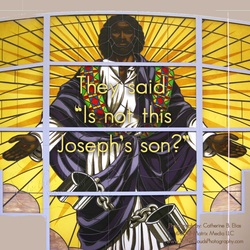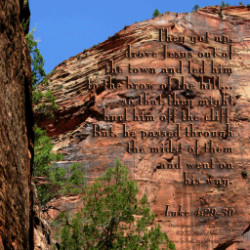21Then he began to say to them, “Today this scripture has been fulfilled in your hearing.” 22All spoke well of him and were amazed at the gracious words that came from his mouth. They said, “Is not this Joseph’s son?” 23He said to them, “Doubtless you will quote to me this proverb, ‘Doctor, cure yourself!’ And you will say, ‘Do here also in your hometown the things that we have heard you did at Capernaum.’” 24And he said, “Truly I tell you, no prophet is accepted in the prophet’s hometown. 25But the truth is, there were many widows in Israel in the time of Elijah, when the heaven was shut up three years and six months, and there was a severe famine over all the land; 26yet Elijah was sent to none of them except to a widow at Zarephath in Sidon. 27There were also many lepers in Israel in the time of the prophet Elisha, and none of them was cleansed except Naaman the Syrian.” 28When they heard this, all in the synagogue were filled with rage. 29They got up, drove him out of the town, and led him to the brow of the hill on which their town was built, so that they might hurl him off the cliff. 30But he passed through the midst of them and went on his way.  This text begs so many questions. And I admit that many of the questions seem offensive to me. For example, is Jesus suggesting that God cares about some people groups more than others. Is he telling his home town that because they act as if they are entitled, they will not receive gifts from God? Are we to hear the congregation accusing Jesus of not being able to heal himself? Is Jesus responding in the defensive? If so, Why? To be honest, Jesus sounds at best like a spiritual leader who has lost his ability to provide a non-anxious presence and at worst, he sounds a little crazy.  And the people are equally crazy. They want to throw him off a cliff? Really? Let's back it up. Jesus reads from the scroll and announces them as his marching orders - his personal marching orders? Their marching orders? What? Who? They answer with the question, "Isn't this Joseph's son?" Let's be honest, we all have people in our lives who will always see us as a child. We have people who helped raise us and no matter the wisdom we offer at the adult table, we belong (to them) at the children's table. Is that what they meant with their question? And then Jesus goes into this rousing monologue about how the prophets of old didn't attend to their "own." What's that supposed to mean? Is Jesus snubbing them? And who are the them really? If they can say, "Don't we know him... Joseph's son?" Can Jesus in turn say the same of them? "I know you - we played kickball in your backyard growing up." Or, come on Aunty, "you were my favorite because you always believed in me." And "uncle, you used to slip us wine after dinner." How well were these folks acquainted? And were they so acquainted with one another that they didn't know one another? My friend Lynn (a fiddle playing preacher whose music can be found here) suggested that we ought to be careful if we think we have Jesus completely figured out. As a way of stretching or challenging or reminding us of the person of Jesus, i offer these final words from the Jesus section of the Brief Statement of Faith of the PC(USA): We trust in Jesus Christ, Fully human, fully God. This week's photos are available for a small fee at To the Clouds Photography.
1 Comment
|
Search this blog for a specific text or story:
I am grateful for
|

This work is licensed under a Creative Commons Attribution-NonCommercial-ShareAlike 3.0 Unported License.
